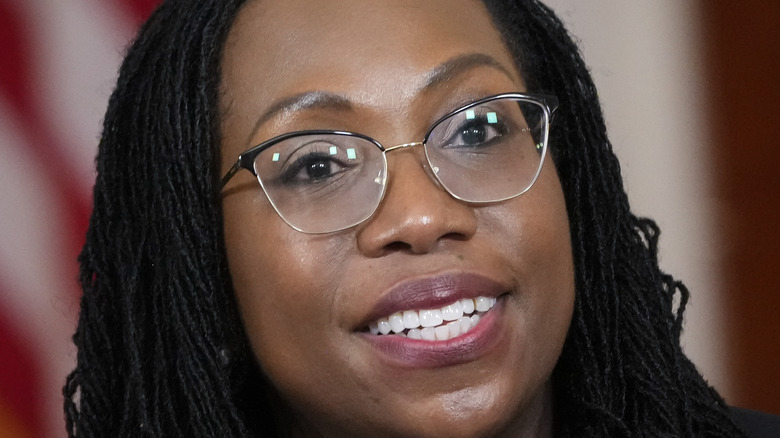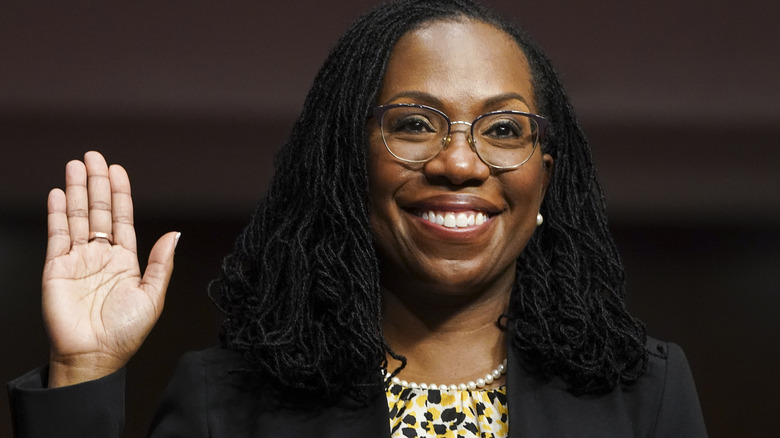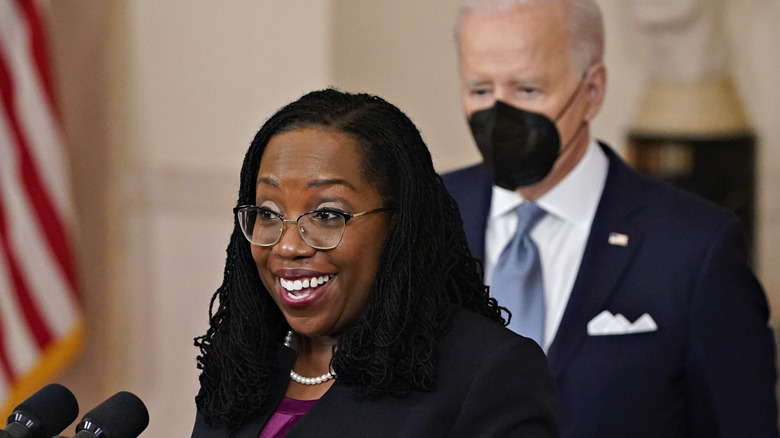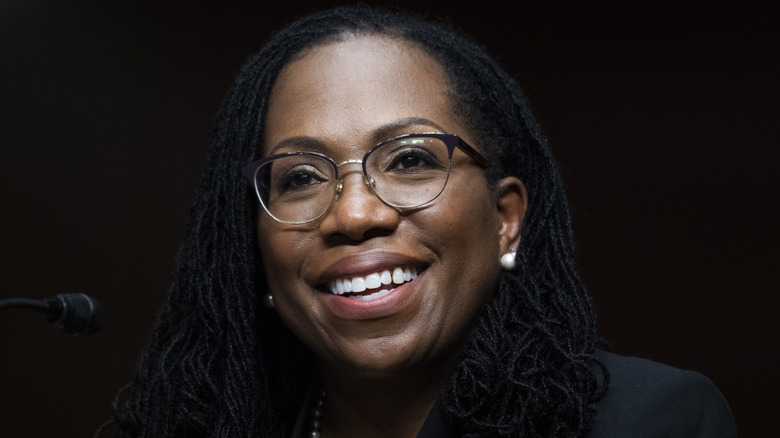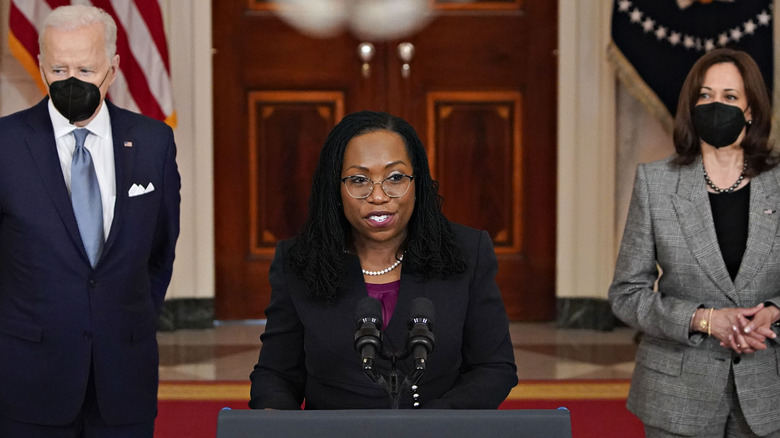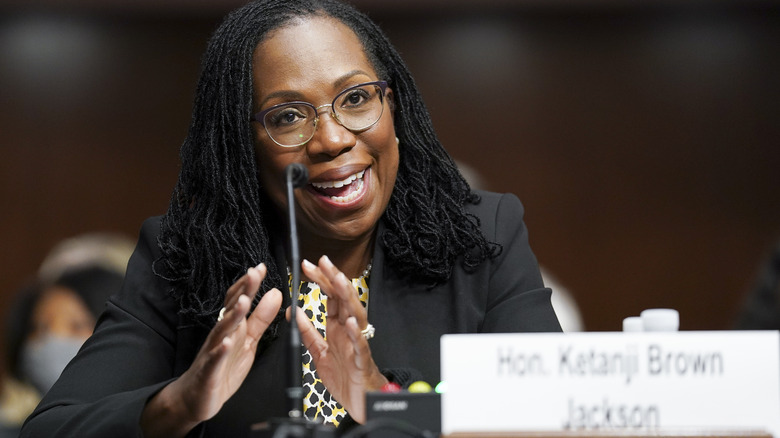What You Never Knew About Ketanji Brown Jackson
People from all over the world are applauding President Joe Biden's recent Supreme Court nomination for several reasons. Biden nominated 51-year-old Ketanji Brown Jackson on Friday, who, if confirmed, would become the first Black woman to sit on the highest court (via CNN). Judge Jackson stepped up as district judge in the U.S. District Court for the District of Columbia in 2013, and was appointed to the U.S. Court of Appeals for the District of Columbia last year by President Biden himself (via Yahoo! News). Now, with the recent Supreme Court nomination, supporters are hoping to have Jackson confirmed by April.
President Biden delivered remarks that showed how ecstatic he is to begin Jackson's confirmation process. The White House also issued a statement about the nomination, saying, "Judge Jackson is an exceptionally qualified nominee as well as an historic nominee, and the Senate should move forward with a fair and timely hearing and confirmation." Meanwhile, the President echoed this wave of support for Jackson in his speech at the White House, saying, "I believe it's time that we have a court reflects the full talents and greatness of our nation," referencing how "for too long, our government, our courts haven't looked like America."
Jackson's confirmation would be an extraordinary win for several reasons. As described by President Biden, one huge one is that it would "inspire all young people to believe that they can one day serve their country." If you're curious about Jackson's background, we've got you covered on all the details about her life.
Ketanji Brown Jackson's childhood
Ketanji Brown Jackson is currently on the U.S. Court of Appeals for the District of Columbia Circuit, awaiting confirmation of a deeply sought-after Supreme Court Justice nomination, and she worked hard for all of her success. As explained on the Supreme Court's blog, Jackson was born in Washington, D.C. on September 14, 1970, but soon moved to Florida as a little girl with her parents. Furthermore, her parents were both graduates of historically Black colleges and universities (HBCUs), and they began their careers as schoolteachers.
The Washington Post adds that Jackson's parents moved to Florida in the post-civil rights eram and gave Jackson "a sense of invincibility" that still runs through her today. Moreover, her name, Ketanji Onyika, is purposely African, as they were always proud of their background and found ample power in it. Because of this, too, they would dress her in a "mini-dashiki," a traditional African clothing article.
"My parents set out to teach me that, unlike the many impenetrable barriers that they had to face, my path was clear, such that if I worked hard and believed in myself, I could do anything or be anything I wanted to be," Jackson said in a speech for Columbia Law School's Empowering Women of Color gala that. And that they did. Her father, Johnny Brown, went on to law school, becoming chief attorney for the Miami-Dade County School Board, while her mother, Ellery Brown, served as principal at the prestigious New World School of the Arts (via News From the States).
The Supreme Court nominee was always driven
There's no doubt that Ketanji Brown Jackson was always a force to be reckoned with, starting with her early education that showed she was committed to excelling and being the best she could be. Per the Supreme Court's blog, the future Judge Jackson went to Miami Palmetto High School, which, notably enough, counts other very notable alumni, including Amazon founder Jeff Bezos and even the U.S. surgeon general Vivek Murthy. There was always something special about Jackson, who became student body president and a debater few could beat. She once explained that, while her peers were off attending parties, she could usually be found keeping to herself, writing and rehearsing her speeches for her debate classes (via The Washington Post).
While Jackson has said her interest in law began by watching her father study law as a child, she said in her senior yearbook that she dreamed of one day nabbing a judicial appointment (via The New York Times). Jackson was ambitious, and told her high school guidance counselor that she wanted to apply to Harvard. When her counselor told her she should not aim "so high" and should consider applying to other schools instead, she applied to Harvard anyway. Spoiler alert: She got in, and only continued to excel. "I recall distinctly not being fazed by the slings and arrows of implicit, or even explicit, bias, and making the conscious decision to push forward nonetheless," Jackson has said (via The Washington Post).
Jackson's time at Harvard and beyond
Jackson first became enamored with Harvard after seeing it for the first time at a debate competition, and was ecstatic to attend. While she has said the cold was "unbearable," she had tons of fun while there. She participated in the improvisation troupe, and took a drama class with Matt Damon himself (via The New York Times). Before graduating in 1992, she met her boyfriend, pre-med student Patrick G. Jackson, from Boston who was a sixth-generation Harvard grad — a stark contrast to her being the second generation in her family to graduate from college. Still, there were many more similarities than differences, and the two soon married in 1996. They now have two daughters together named Talia and Leila.
While Jackson had fallen in love and soon graduated magna cum laude, her time at Harvard wasn't all roses and butterflies. As described by The Washington Post, one of her peers chose to display a Confederate flag outside his dorm window right in the middle of campus. Jackson later recounted how this move was meant "for us to be so distracted that we failed our classes and thereby reinforced the stereotype that we couldn't cut it at a place like Harvard," but she wasn't going to take it sitting down. The future judge was part of the Black Students Association, and led protests against the university's response to the act, while also calling for more hires in the African American studies department.
After graduation, Jackson only continued her path upward
After graduation, Jackson became a reporter for Time Magazine. After that, she attended Harvard Law School, graduating in 1996. She then completed several clerkships. Jackson served as clerk to U.S District Judge Patti Saris in Massachusetts from 1996 to 1997, going onto another clerkship from 1997 to 1998 under Judge Bruce Selya (via the Supreme Court's blog). Jackson then joined one of the top law firms in the country — Miller Cassidy Larroca & Lewin — for one year. She then strode through her last clerkship, now at the Supreme Court with Justice Stephen Breyer from 1999 to 2000.
While completing her clerkship at the Supreme Court, she witnessed several big cases, including Stenberg v. Carhart, which found a Nebraska law banning what they deemed "'partial birth' abortions" unconstitutional. By the early 2000s, Jackson was a law firm associate, and had clients like the League of Women Voters and NARAL Pro-Choice America. Leaving the firm to work in the the U.S. Sentencing Commission to work on more equality in federal sentencing, she then became an assistant federal public defender in 2005. Representing people who could otherwise not hire a lawyer, she has said she was "struck" by her clients' lack of understanding of the law, and took "extra care" to explain the facts. If appointed to the Supreme Court, Jackson would become the first federal public defender to serve in the position (via Yahoo! News).
Ketanji Brown Jackson's most recent moves
In 2010, President Barrack Obama took note of Ketanji Brown Jackson's legal prowess, nominating her as vice-chair of the Sentencing Commission, where she worked to bring down harsh sentences and ensure legal fairness (via the Supreme Court's blog). By 2012, President Obama nominated Jackson to serve as U.S. district judge in Washington, D.C. She did so until 2020, and ruled on several high-profile cases. For one, she ruled in 2019's Committee on the Judiciary v. McGahn that Don McGahn, former White House counsel under President Donald Trump, would have to testify to lend information to the House Judiciary Committee's investigation into Russia's involvement in the 2016 election. Jackson famously wrote, "The primary takeaway from the past 250 years of recorded American history is that Presidents are not kings." She further said that the White House and its employees works "for the People of the United States" and "take an oath to protect and defend the Constitution."
By 2021, Jackson was officially nominated to serve as a judge on the D.C. Circuit by President Biden, following former D.C. Circuit Judge Merrick Garland's nomination for Attorney General. While she was allegedly contacted about the nomination in January 2021, she was confirmed in April, which was a victory for all sides of the political spectrum. In fact, a letter signed by 23 lawyers who have clerked with Jackson references her incredible "legal abilities, her work ethic, and her ability to work with colleagues of both like and differing views."
